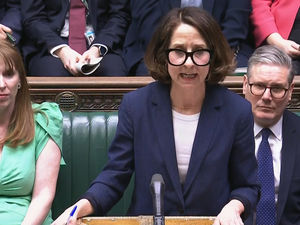Where now for Ukip?
Harold Wilson famously said that a week was a long time in politics. But for the UK Independence Party, the past two years must seem like a millennium.
Back in the summer of 2016, Nigel Farage was the man of the moment. After more than two decades of campaigning for Britain to leave the European Union, the party had achieved what it set out to do. Donald Trump invited Farage to one of his rallies, hoping that a bit of his populist stardust would rub off on himself.
Now, little more than 22 months after the historic Brexit vote, the party's former deputy chairman Suzanne Evans has admitted the party could be in a battle for survival following a drubbing in this week's local elections. The party, which had established itself as the third force in local government, was wiped out in Thursday's local elections, losing more than 90 council seats.
Miss Evans, who lives in Shrewsbury, says the party still has the ability to 'set the cat among the pigeons'.
"If Ukip does crumble I think you could still arguably make the case that it's been one of the most successful political parties in history," she said.
And indeed it is hard to deny Ukip's oft-repeated claim that if it had not been for the efforts of Ukip, particularly under Mr Farage's colourful leadership, then there would never have even been a referendum on whether Britain should remain in the EU, let alone a successful campaign to leave. The problem has been finding a new raison d'etre in post-Brexit Britain.
Of course, it is not the first political movement that was borne out of a single issue. The US Republican Party was set up to end slavery, and the original British Tory Party opposed measures to prevent the Catholic King James II from ascending to the throne. But while these parties have managed to broaden their appeal once their original objectives were achieved, Ukip so far seems to have found this difficult.
Many of Ukip's problems, such as the ready supply of unfortunate off-guard comments, stem from a lack of professionalism or discipline, something which has probably blighted most of our political parties in their early days. But in the age of the 24-hour media, where every Twitter and Facebook quip is forensically analysed, it is much harder to get away with such indiscretions
It would also be a mistake to underestimate the Farage factor. While Ukip did enjoy some success in the European parliament before Mr Farage became leader, it was very much a niche movement, drawing support mainly from the middle-class and academic eurosceptic circles. It was Farage's larger-than-life personality and outspoken comments, his carefully crafted persona as the beer-swilling, no-nonsense man-of-the-people which brought the party into the mainstream. And while the Ukip is at present the largest British party in the European parliament, and has enjoyed some success in local elections, it has never made the expected breakthrough at Westminster. In 2008 Bob Spink became the first sitting MP to defect from the Conservatives to Ukip, although he sat in the Commons as an independent. In 2014, Tory MPs Mark Reckless and Douglas Carswell caused a stir when they quit their seats and won the subsequent by-elections under the Ukip banner. Reckless lost his seat at the following General Election, but Carswell was re-elected before finally quitting the party in 2017.
And without representation at Westminster, and the media exposure that goes with it, it is perhaps not surprising that Ukip has struggled to find a high-profile successor to Mr Farage.
Bill Etheridge, MEP for the West Midlands constituency which includes Shropshire, was once touted as a possible successor. But having lost his council seat in Dudley this week, he delivered a withering criticism of the party's present leader and announced he would be quitting politics when his term in the European Parliament ends next year.
Of course, it is hardly the first time that people have written off Ukip's chances, and the party which revels in its place as the anti-establishment underdog has a habit of bounding back.
As Ukip's general secretary Paul Oakley said, in a not altogether successful attempt to put a positive spin on his party's collapse in local government:
"Think of the Black Death in the Middle Ages. It comes along and it causes disruption and then it goes dormant, and that's exactly what we are going to do."



